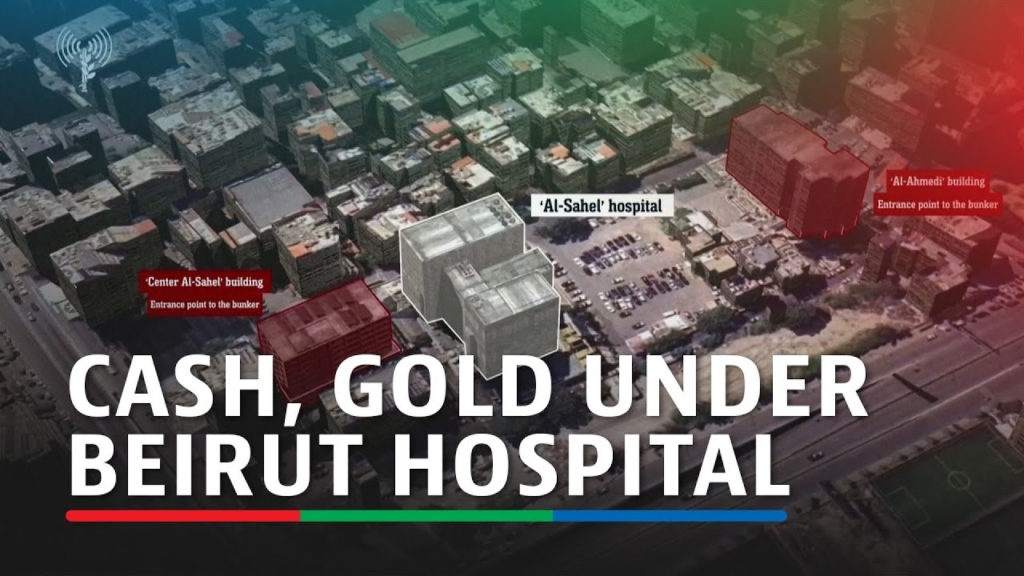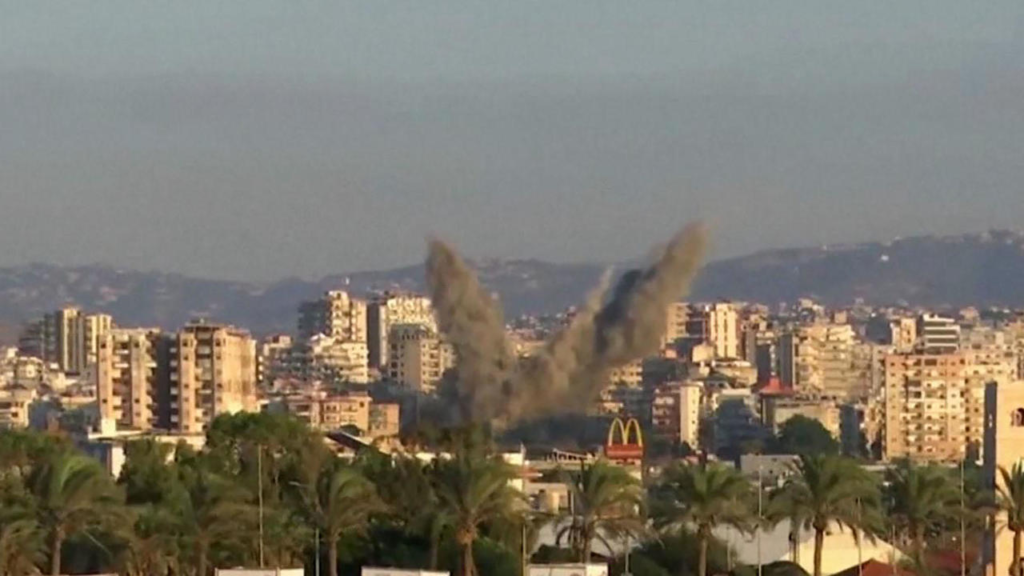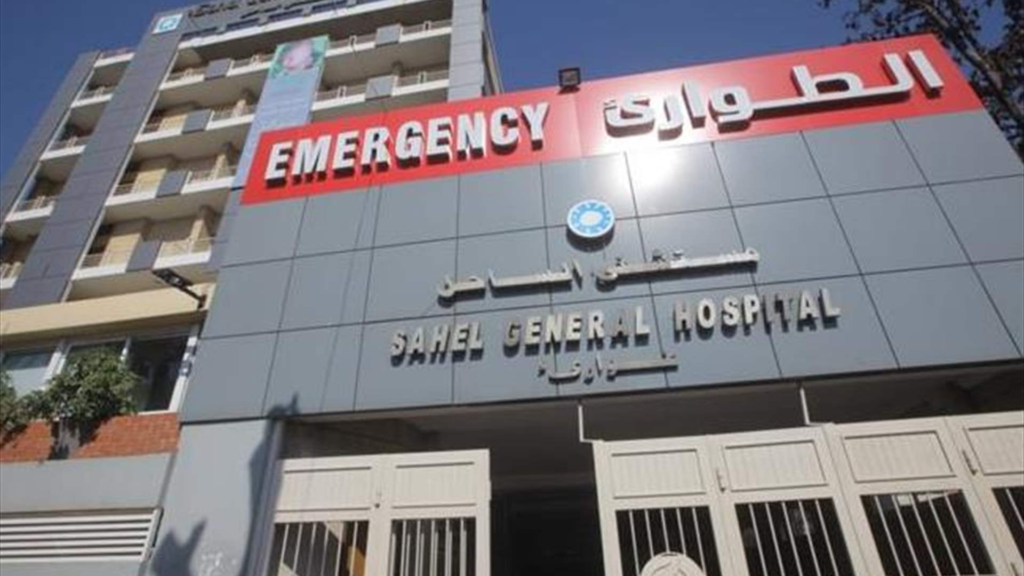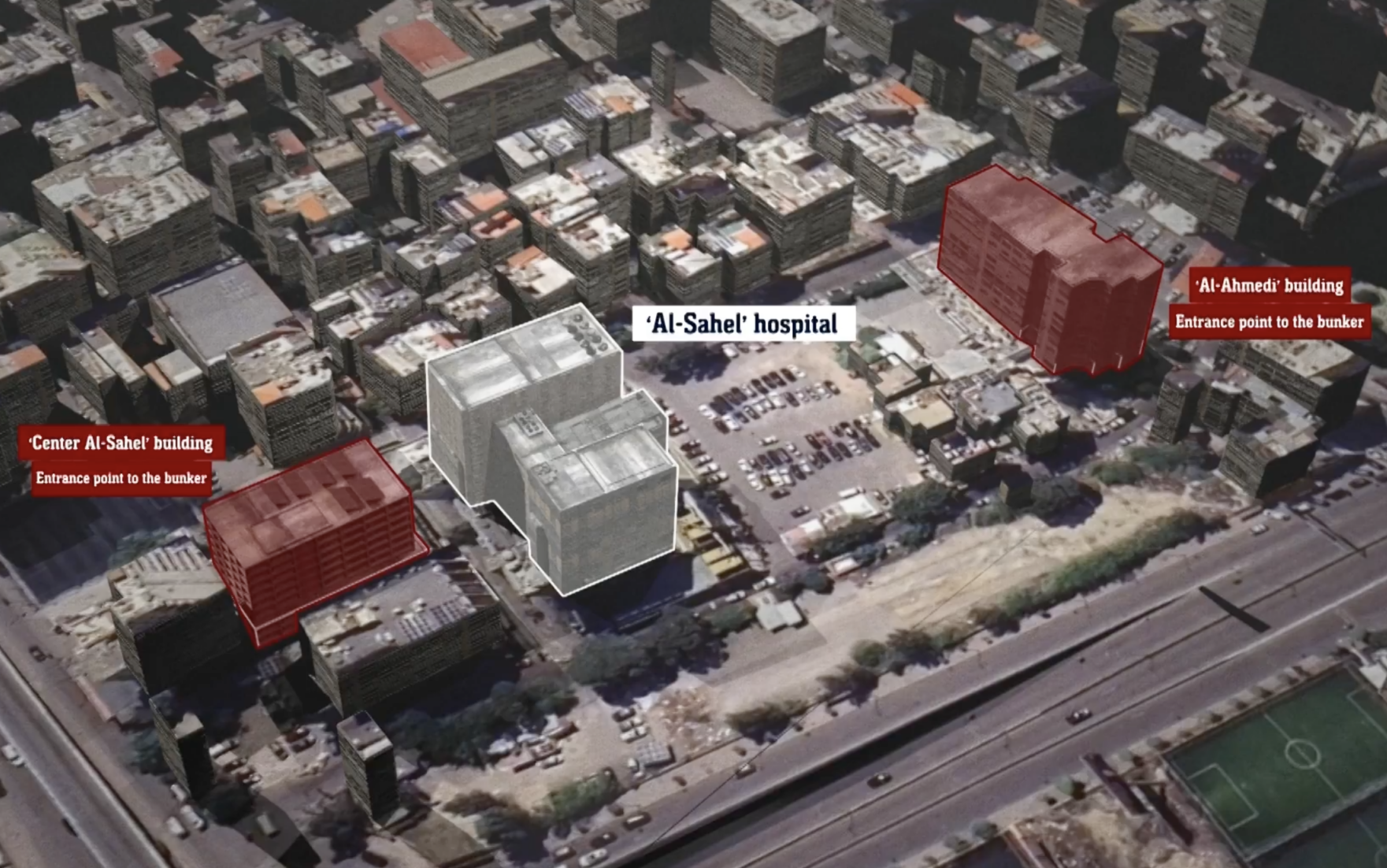The ongoing conflict between Israel and Hezbollah has escalated, with new accusations from the Israeli military that Hezbollah is hiding hundreds of millions of dollars in cash and gold under a hospital in Lebanon.
The revelation came after a series of Israeli airstrikes targeted Hezbollah’s financial strongholds, leading to the discovery of a secret underground bunker beneath the hospital in the southern suburbs of Beirut.
This bunker, according to Israeli authorities, contains vast sums of money used to fund Hezbollah’s operations and attacks on Israel. The discovery has intensified the already strained relations between Israel and Lebanon, raising concerns about the future of the region and the role of Hezbollah’s financial networks.
The Discovery of the Hezbollah Bunker
Israel’s claim that Hezbollah has been using an underground bunker beneath a hospital to store an estimated $500 million in cash and gold has sent shockwaves through the international community.
Rear Admiral Daniel Hagari, an Israeli military spokesman, stated that the Israeli Air Force had carried out precise strikes on Hezbollah’s financial hubs, with one of the main targets being an underground vault filled with cash and gold. According to Hagari, the money was being used to fund Hezbollah’s ongoing attacks on Israel and support its operations across the region.
Read : Israel Gives Demand List to White House for Ending War in Lebanon
The underground facility is believed to have been designed for extended stays and is equipped to store vast amounts of money and resources. Israel’s intelligence suggests that this bunker was built by Hezbollah’s former leader, Sayyed Hassan Nasrallah, who was reportedly killed in an Israeli airstrike last month.
The bunker, hidden beneath a hospital in Beirut’s southern suburbs, has raised ethical and moral questions about the use of medical facilities for military and financial purposes.
While the Israeli military has released animated graphics to illustrate the existence of the bunker, no physical evidence has been provided to substantiate the claim that such a large amount of cash and gold is hidden there.
By publishing these pictures, the Zionist media claim that Hezbollah has stored at least half a billion dollars of money and gold under Al-Sahel Hospital in Beirut.
— Monitor𝕏 (@MonitorX99800) October 21, 2024
Now they want to bomb hospitals in lebonan as they did in GAZA pic.twitter.com/FyZBZtztVS
The allegations have been met with strong denials from Lebanese officials, including Fadi Alameh, a Lebanese lawmaker and the director of the hospital in question. He dismissed Israel’s accusations as false and slanderous, urging the Lebanese Army to inspect the facility and verify that it only houses patients, operating rooms, and a morgue.
Hezbollah’s Financial Network Under Scrutiny
The claims against Hezbollah highlight the group’s extensive financial networks, which have long been a subject of concern for Israel and the international community. Hezbollah, designated as a terrorist organization by several countries, including the United States and Israel, has built a complex web of financial operations to fund its activities. The discovery of a bunker filled with cash and gold is a significant development, shedding light on how Hezbollah sustains its military capabilities.
Al-Qard al-Hassan, an organization believed to be Hezbollah’s financial arm, has been a primary target of Israeli airstrikes. Israeli Chief of the General Staff, Herzi Halevi, stated that the strikes on Hezbollah’s financial sites are part of a broader effort to cripple the group’s financial infrastructure. He added that more strikes are planned to disrupt Hezbollah’s ability to fund its operations.

The financial network of Hezbollah is vast, with assets reportedly spread across various sectors, including businesses, charitable organizations, and underground banking systems. These networks are believed to be responsible for laundering money, smuggling goods, and funding militant operations.
The recent discovery of the bunker has added a new dimension to Hezbollah’s financial operations, suggesting that the group has been storing large sums of wealth in secret locations to fund its long-term goals.
Israel’s concern is not only that the money stored in the bunker is being used to finance attacks on its territory, but also that these funds could be used to rebuild Lebanon.
Rear Admiral Hagari emphasized that the $500 million in cash and gold could play a significant role in Lebanon’s post-conflict reconstruction. He urged the Lebanese government and international organizations to intervene and prevent Hezbollah from using the funds for violent purposes.
Impact on the Israel-Hezbollah Conflict
The discovery of Hezbollah’s hidden wealth comes at a time when tensions between Israel and Hezbollah are at an all-time high. The conflict between the two has intensified since October last year when Hezbollah declared its support for Hamas after the October 7 attacks. What started as a show of solidarity with the Palestinians has escalated into a violent exchange of fire across the Lebanese-Israeli border, with both sides suffering casualties.
Israel’s expanded military operations against Hezbollah have led to frequent airstrikes on Hezbollah’s positions in Lebanon, particularly targeting its financial infrastructure. The Israeli government has made it clear that it views Hezbollah’s financial assets as critical to the group’s ability to wage war, and it has vowed to continue striking these assets to neutralize the threat.

The cycle of violence between Israel and Hezbollah shows no signs of abating. Hezbollah’s influence in Lebanon, particularly in the southern regions, has made it a formidable force in the region. The group’s ability to raise funds through various means, including cash reserves, gold, and business interests, has allowed it to sustain its operations despite international sanctions and military pressure.
For Israel, the discovery of the bunker is both a tactical victory and a challenge. While it has managed to expose Hezbollah’s financial networks, it has also drawn attention to the delicate nature of military operations in urban environments.
Striking targets hidden beneath civilian infrastructure, such as hospitals, poses significant moral and legal dilemmas. The Israeli Air Force has stated that it will refrain from striking the hospital itself, despite its belief that Hezbollah is using the facility for financial and military purposes.
The Lebanese government, for its part, has condemned Israel’s actions and denied the existence of any Hezbollah financial assets in the hospital. The situation has further strained relations between the two countries, with both sides accusing each other of violating international law and escalating the conflict.
As Israel continues its campaign against Hezbollah’s financial assets, the long-term implications of the discovery remain uncertain. Hezbollah’s ability to operate in Lebanon with the support of various factions within the country’s political system makes it difficult for Israel to completely neutralize the group.
Furthermore, the presence of large sums of money and gold in hidden bunkers suggests that Hezbollah has contingency plans in place to sustain its operations even in the face of significant military and financial pressure.

The international community has been slow to respond to the latest developments, with calls for a ceasefire and diplomatic negotiations gaining little traction. The conflict between Israel and Hezbollah is deeply rooted in decades of territorial disputes, political tensions, and ideological differences.
The discovery of Hezbollah’s hidden wealth adds another layer of complexity to the conflict, as both sides grapple with the consequences of the escalating violence. The discovery of more than $500 million in cash and gold hidden in a bunker beneath a hospital in Lebanon has brought new attention to Hezbollah’s financial networks and their role in the ongoing conflict with Israel.
While Israel has accused Hezbollah of using the funds to finance attacks on its territory, Lebanese officials have denied the allegations, leading to a heated dispute between the two sides. As the conflict continues, the future of Hezbollah’s financial operations and their impact on the region remains uncertain.
The international community’s response to these revelations will be crucial in determining whether the conflict can be de-escalated, or if it will continue to spiral into further violence and instability.

